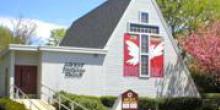Inspiring Stories
SIN SCHMIN
Sin is such an old fashion word. We just don’t use it in everyday speech anymore. Sin no longer causes disease and disability, that job is given to disease, bacteria, viruses, and defective genes. Sin doesn’t cause war and invasion – politics gone awry does. When a nation suffers from a tornado, hurricane, earthquake, or typhoon we no longer think those people must have been terrible sinners to be punished in such a way.
In a sense, by abandoning the word sin we have also abandoned the concept of ownership - of blame - of guilt. No body owns disease or accident – they are acts of fate, accident, Mother Nature – or, as the insurance company calls it when they don’t want to pay for your Sandy damage, an “uninsured act of God!” It’s wonderful how God is finally brought into the picture!
Now I certainly don’t want to accuse sick people of being worse sinners than well people, or people whose house was blown away in a tornado as being worse sinners, than the family next door whose house was spared. But human beings, as individuals and as a group, are still responsible for many of the things that happen in this world. Someone needs to take the blame for them. All of us need to share in the guilty – and seek and receive forgiveness.
When everything is accident and fate, there is no need for sin. When we take responsibility for our mistakes - our sin – and come before God, we believe that as individuals and as communities we are granted the gift of repentance, and forgiveness.
When Apartheid ended in South Africa, the late great Nelson Mandela set up, as President, “Truth and Reconciliation Boards”. People could own up to what they had done during the dark days of racial strife, and be assured of pardon and peace. They would not live for the rest of their lives waiting for the law to catch up to them, like some run-away Nazi turned auto worker in Cleveland. But, for this system to work, people needed assurance of eventual pardon, and needed to come forward.
Sin is really not an obsolete word, even though it is seldom used. Sin is a perfect word for the evil thoughts, words, and deeds of which we must take ownership. Sin may not cause disease, but human selfishness, greed, pride, arrogance, and carelessness lead poor people, old people, homeless people, and people in underdeveloped nations, to be sicker, and to die at much younger ages. Racial prejudice continues to lead to great suffering, as does bullying and sexual stereotyping. Without the concept of sin, how can we understand that this is a fallen world. Without our taking ownership of our personal short comings, how can we begin to accept the grace of our loving God?
Our Church teaches that we are all sinful and unclean. Although created good by our loving God, we are fallen and live in a fallen world. We also teach that God entered this fallen world in Jesus to rescue it, to save us. This is what we celebrate at the Easter season. There is no Easter without the realization of the sin that makes our Lord’s presence necessary.
So the Church established hundreds of years ago this season of Lent: a time of penitential preparation. Lent ends with the dramatic retelling of Jesus' death and exciting celebration of his resurrection.
Please remember why Jesus was born, lived, died and rose. Please stop a moment and consider your shortcomings, your failures, your life. Receive the gift of repentance from God and the forgiveness that flows and enriches us all.

